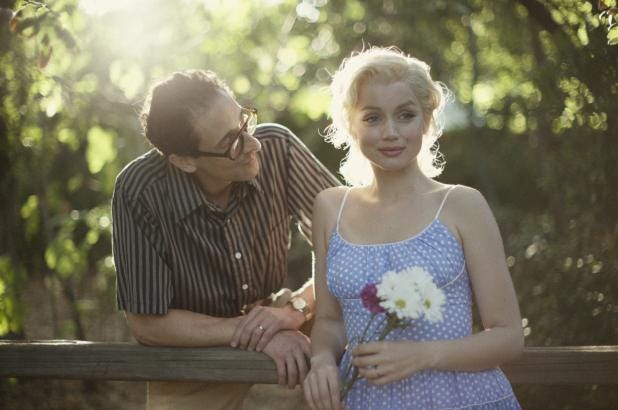Quick Thoughts - Darker & more disturbing than any horror movie, Blonde is a drawn out nightmare that never lets you wake up. Throughout the film, Dominik makes the frustrating choice to graphically portray a Monroe that gets drug through life and not the Monroe that overcame darkness to do great things.
The Good - This film is visually stunning in every sense of the word. Andrew Dominik makes quite a few poor and baffling choices throughout the production of this film (we will get to those in due time), but very few of them center around the filmmaking style and tricks he uses to move the camera and cut the film together. He does a decent job making the audience feel like they are going through things as Marilyn did, hallucinating when Marilyn did, and hurting when Marilyn hurt. One particular scene where Marilyn is hallucinating includes some of the most creative and out of the box transitions that I have ever seen before in a film.
While this is the only redeeming quality of the film, it is worth noting that it really saves the film from being completely unbearable. Multiple times when you are close to checking out from the film entirely, a peculiar transition or whacky technique will save your attention. For this reason, the film won’t be entirely written off by critics because it is appealing on the eye and a remarkable feet from that perspective.
On top of the camera movement and unique transitions, Dominik jerks the film back and forth between color and black and white throughout to make the audience really focus in on certain aspects. He does the same thing through certain snippets of the film that play out in slow motion.
Here is the tough part though, while both of those techniques are incredible and make it stylistically stunning piece of media to look at, it actually makes it a worse film overall. It may be pretty to look at, but those effects also make it unbearable to watch. We are already suffering through a three hour film about the worst moments in somebody’s tragic life, do we really need to see it in half speed or take away our one sensory way to escape the nightmare, our color palette? While most filmmakers would shy away from such a choice, Dominik embraces it with open arms.
The Bad - There is a laundry list of things that could be expounded upon as to why this film just doesn’t work, but the biggest and most prominent is the one dimensional nature of the story. Essentially Dominik is saying with this film, “a lot of bad things happened to Monroe throughout their life, now watch them all in sequential order for three hours.” It is twisted, sadistic, and cruel to Monroe for her to be solely portrayed in this light given all we know about her accomplishments in life. This is the same woman that started her own production company, pursued great filmmakers she wanted to work with, loved reading so much that she enrolled in evening classes at UCLA, converted to Judaism to marry Arthur Miller, and got involved politically.
Despite all that she did and accomplished, this film isn’t interested in showing any of it or even acknowledging that she had the capacity to do important things. It gives her no credit or agency at all. From the film’s perspective you would think that she was simply a woman who had a terrible childhood and was so messed up by it for the rest of her life that she was just used and abused till the day she died - that is part of her story, not the full story.
The worst part about all of this is that most of the movie isn’t even true. In fact, the film is based off of a novel that describes itself as a fictionalized interpretation of what Monroe’s life MAY have been like. So, essentially almost all of the horrific things that are GRAPHICALLY portrayed on screen, are just someone’s ideas of what may have happened to her. Exactly how bad is it?
In real life her mom struggled with some mental problems. In the film, her mom burns their apartment down and attempts to drown Marilyn in their bath tub - both of which NEVER happened
One of the central plots of the film centers around her having a longstanding relationship with Charlie Chaplin Jr. and Edward G Robinson Jr at the same time and that these men helping to sexually awaken her - in reality, she never had a relationship with them.
The film portrays a graphic forced abortion that is shot from the perspective of inside Monroe while the abortion takes place (I promise that the scene is just as degrading as it sounds). While studios forcing young actresses to get abortions was a common practice back then, there is no proof at all to suggest that Monroe was even pregnant at the time.
In the film, the second time Monroe is pregnant, a CGI fetus talks to her and asks if she will hurt him like she did the other one. Absolutely certain that never happened, but another trick Dominik uses to drag Monroe through the mud
Most of the positive coverage of the film has centered around how this movie puts you right inside her mind, but it honestly doesn’t even do that because most of what is portrayed isn’t even real. On top of that, even if it was real, we all know she had a rough life. It is well documented that Monroe had a terrible life, so why spend three hours trying to hammer home something that we already know? And why portray each of those terrible things as even worse and more graphic than they actually were? Why take someone who still accomplished quite a bit despite all the tragedy in her life and then demoralize and humiliate her in this way?
For years Dominik had the idea for a film of this style but instead the subject matter was a serial killer. What made him think the same style would work on Monroe? I will never know the answer, but it is very clear that he didn’t change his strategy - focus on all the bad and messy of the subject matters life. That may work for a serial killer, but Monroe isn’t a serial killer. Dominik however seems to think that she has the equivalent emotional capacity or clarity as one.
This film doesn’t put you in the mind of Monroe, but what i does do is diminishes her to a child-like woman that couldn’t go five seconds without calling someone daddy and asks you to pity her, but then stops there and doesn’t ask anything more of the audience. There is much to be sad about Monroe’s life, but asking an audience to sit in that for three hours is a fairly pointless endeavor. It isn’t interested in the highs or even the real lows of her life, only the fictional lows.
Rating - 35/100
Best Performance - Ana de Armas as Marilyn Monroe - I don’t think Ana will be apart of the awards season conversation since they didn’t give her very much to do in this film besides cry, scream, and say daddy. Would have loved to see what Ana could have done with the more comedic side of Monroe’s personality, but unfortunately the movie wasn’t tonally going for that. The failures of this role lie not on her shortcomings as an actress but on the shortcomings of the direction she was given by Dominik and the tone of the film.
Honorable Mention - Adrien Brody as Arthur Miller
Will I watch again - Not if I have anything to say about it
Would I recommend - Honestly, I wouldn’t. I hope that in five years time this film is completely forgotten. Hopefully some of the framing techniques and visual artistry are utilized by film makers around the world, but outside of that I don’t think this film has anything else positive to give society.
Final Takeaways - This film has been making headlines the second it was announced that it had a NC-17 rating. I went into the film thinking that the nudity or sexual content was going to be the thing that rubbed me the wrong way, but it is now apart that isn’t even the biggest problem with the film. The gist of everything is that Dominik was trying to tell a story that didn’t need to be a three hour film. The one sentence summary - Monroe had a terrible childhood which resulted in a pretty messed up life. That can’t by itself be the subject of a three hour film, there has to be more angles and dimensions that are examined and explored. By the second hour you are yelling at the screen saying, “We get it! She had a bad life”. If someone fictionalized only the worst moments of my life and made a three hour movie about those moments only, you wouldn’t get a sense for who I truly was or what my life was really like. The same is true for Monroe in Blonde. This isn’t who she was, it is simply one twisted person’s view of what her life was like.






